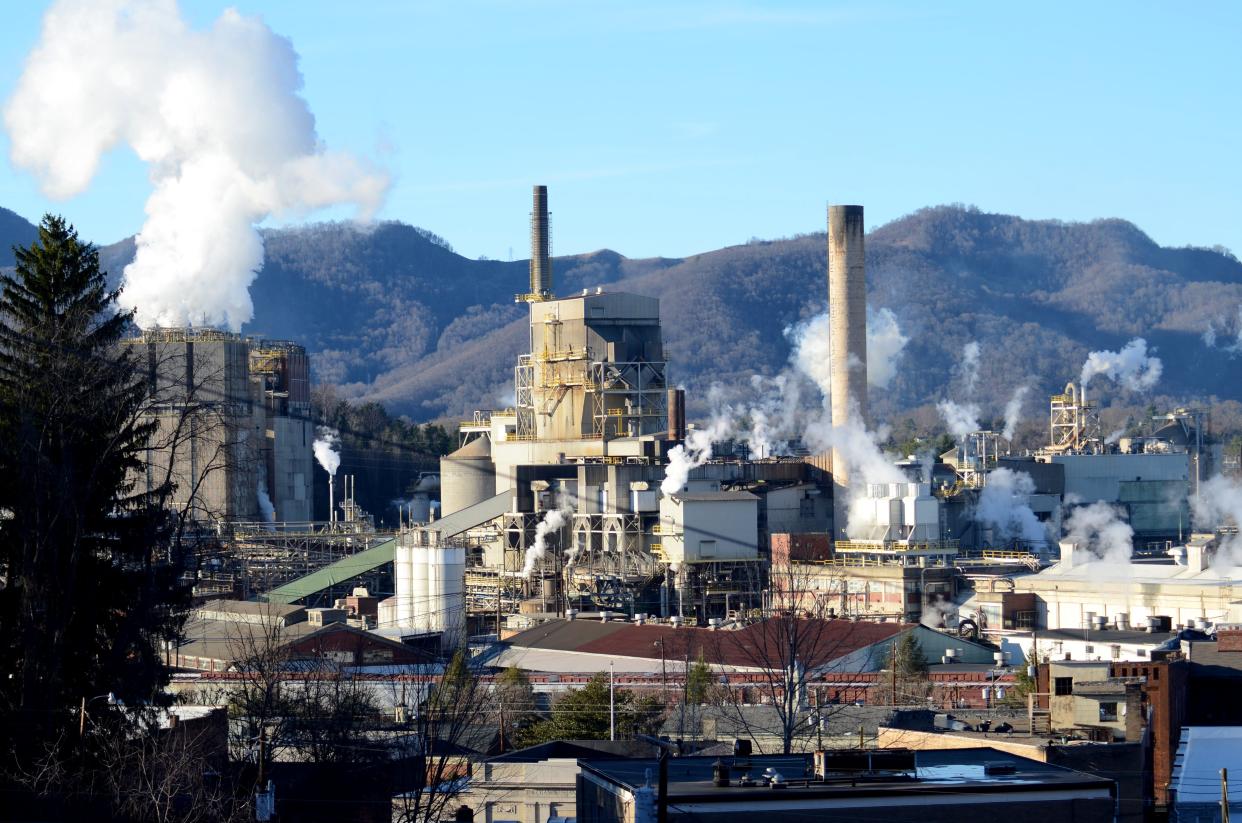Canton mill accused of illegally dumping chemicals into wastewater system

The Pactiv Evergreen paper mill in Canton faces allegations of illegally dumping chemicals into the wastewater system during the recent plant shutdown process, according to the Department of Environmental Quality.
On June 5, the DEQ’s Division of Water Resources received a complaint that staff at the Canton mill were disposing of sodium hydroxide solution and calcium hydrochlorite directly into a wastewater treatment system, according to a notice of violation obtained by the Citizen Times July 13. A photo accompanying the complaint shows a hose attached at one end to a chemical tote labelled sodium hydroxide and the other end appears to be positioned over a floor drain.
The mill faces three violations of dumping chemicals into the wastewater system, including making outlets into waters of the state without permit, failure to mitigate and failure to comply.
“To hear so close to closing the accusations that they were deliberately dumping illegal chemicals into the river is just disgusting and disrespectful,” Canton Mayor Zeb Smathers told the Citizen Times July 13. “Here is another chapter in a long story of what boils down to disrespect for our community and our region, and when I talk about our region, I mean our mountains and our rivers. The river brought the first settlers to Haywood County – my family was one of them. It brought the paper mill, and it will bring us our future.”
Discharges from the Canton mill feed into the Pigeon River, according to Josh Krastrinsky, spokesperson for the DEQ’s Division of Water Resources. The river flows through the middle of the historic mill town.
More: Canton paper mill closure: What happens next for former employees, the town?
Facility staff told the DEQ in a call June 7 that used sodium hydroxide is sometimes diluted before disposal into the wastewater system, which has a National Pollution Discharge Elimination System permit.
The mill has been responsible for Canton’s wastewater treatment, and Pactiv Evergreen will be required to continue providing this for the next two years, the Citizen Times previously reported.
“Their responsibility to run wastewater will be independent of this investigation,” Smathers said.
The DEQ and Pactiv Evergreen disagree about whether the disposed chemicals are covered under the mill’s permits. On June 9, representatives of the Canton mill stated, “this type of process is inherent to the shutdown operations,” insisting that the dumped materials are allowed under their NPDES permit and could be disposed of through the wastewater system, according to the violation notice.
But the mill was told twice before that these disposals are not allowed. After the shutdown was announced, DEQ “specifically stated” in a meeting with facility staff that “the dumping, disposal or discharge of unused or virgin chemical products or materials into the NPDES permitted wastewater system is prohibited,” according to the notice of violation. Then again on June 7, DWR sent an email to facility staff stating, “the direct disposal of raw material or product is not covered under your NPDES permit as it is not a wastewater nor a by-product of an industrial process.”
Citizen Times reached out to Pactiv Evergreen for comment but did not receive a response before press time.
More: Canton paper mill closing a 'regional crisis,' mayor says; Buncombe also affected
The DEQ asked Pactiv Evergreen to respond to the violation letter with a description of the materials discharged since the beginning of shutdown period, a narrative explaining the mill’s position that the disposal was permitted, and a description of the activities depicted in the photos sent to DEQ.
“In terms of penalties they are going to face, it is too early to determine that,” Krastrinsky told the Citizen Times July 13. “There’s a series of factors that must be considered when assessing civil penalties under statute like this. The next steps are dependent on the response from the facility.”
The company has 10 days to respond to the DEQ and could face fines of up to $25,000 per day, per violation, according to Krastrinsky.
If a fine is charged, it might not be the only sizeable bill Pactiv Evergreen must pay. In 2015, the state provided a $12 million grant to Pactiv Evergreen, on the condition it keeps at least 800 employees on staff at the Canton mill through the end of 2024. Attorney General Josh Stein and Gov. Roy Cooper wrote an open letter to the company soon after the mill’s closure was announced demanding it returns the grant.
“I can promise you the conversations between us, the governor’s office, the Department of Commerce and Attorney General Stein’s office are still ongoing,” Smathers said regarding an update on the grant.
“Evergreen is not going to be in a position where they are not responsible for what the law says. We are going to hold them accountable everyway that we can,” Smathers said. “I want to thank Secretary Biser at DEQ and everyone involved, because what you are seeing is not just talk, it’s action. They are keeping a very watchful eye down there, and we should all appreciate that as taxpayers.”
Ryley Ober is the Public Safety Reporter for Asheville Citizen Times, part of the USA Today Network. News tips? Email Ryley at rober@gannett.com. Please support local, daily journalism with a subscription to the Citizen Times.
This article originally appeared on Asheville Citizen Times: Canton mill illegally dumped chemicals into wastewater, DEQ says

